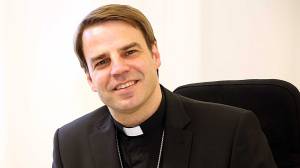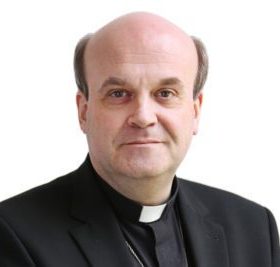Pope emeritus Benedict XVI’s essay on what he perceives to be the causes for the sexual abuse crisis in the Church (and beyond) is causing much discussion on social media, which can be divided in two debates: the first on the content, and the second on the author.
I want to share some thoughts on that second debate. There are those who believe that a pope emeritus should never be heard from. And should he be heard from, that means he is undermining the policies and pastoral activity of the current pope. That is an untenable position in the case of Benedict XVI’s essay, as he is not proposing any policies or criticising anything that Pope Francis has said or done. Benedict writes that he informed both Pope Francis and Cardinal Parolin about the essay before publishing it in a minor periodical for Bavarian clergy. All involved, however, must have known that the essay, coming from the retired pope, would not remained limited to the audience of that publication for long. It is a safe assumption, therefore, that both the pope emeritus and the current pope are at peace with the essay being read across the world.

To claim that this text is an attack or criticism on Pope Francis is symptomatic of the politicising happening in the Catholic Church. Everything, it seems, has to be seen as either right- or left-wing, with the pope emeritus being taken as a spokesman for the right and Pope Francis as one for the left, This is not only a simplification, but also seriously harmful. If we take successive popes as being automatically contrary to each other, the conclaves and the papacies of each vicar of Christ become nothing but political spectacles. The papacy has its political elements, sure, but it is in the first place a pastoral ministry, if at a global scale. And that ministry has its continuity, although the person exercising it periodically changes. What Pope Benedict XVI said and did is not by definition contrary to what Pope Francis says or does, even if both men, having different personalities, focus on different elements and express themselves differently. The continuity remains, and that is why it is also entirely irresponsible to see what one pope says and does in isolation from what his predecessors did and said (and from the deposit of the faith in which they stand and act). If that happens, you get radically different (mis)interpretations, the likes of which we have seen on an increasing scale in recent years.
The knee-jerk reactions I see in the wake of Pope emeritus Benedict XVI’s essay reveal that there is a strong tendency among many to place him in automatic opposition to Pope Francis, and whatever they see the latter standing for. This is not only unjust, but also dishonest.
Photo credit: CNS/L’Osservatore Romano
 The main contribution, certainly in word count, comes from Bishop Dominikus Schwaderlapp, auxiliary bishop of Cologne, who wrote an article about the topic for the Tagespost (subsequently
The main contribution, certainly in word count, comes from Bishop Dominikus Schwaderlapp, auxiliary bishop of Cologne, who wrote an article about the topic for the Tagespost (subsequently  Bishop Helmut Dieser of Aachen
Bishop Helmut Dieser of Aachen  “Celibacy is the way of life of Jesus and as such a great spiritual treasure, which is worth fighting for. But I do not rule out the possibility (of a loosening of the celibacy rules). When the majority of priests say that it is no longer possible to live celibately in this time and society, then it becomes difficult. On the other hand I do not want the priest who is already struggling with his way of life, but who has made an oath, now reading, “the bishop also says that it is difficult, so I’ll also give it up.” I do not want to demotivate, I want to say: the struggle is worth it.”
“Celibacy is the way of life of Jesus and as such a great spiritual treasure, which is worth fighting for. But I do not rule out the possibility (of a loosening of the celibacy rules). When the majority of priests say that it is no longer possible to live celibately in this time and society, then it becomes difficult. On the other hand I do not want the priest who is already struggling with his way of life, but who has made an oath, now reading, “the bishop also says that it is difficult, so I’ll also give it up.” I do not want to demotivate, I want to say: the struggle is worth it.” In their spring assembly, which this year took place in the Emsland town of Lingen, in the Diocese of Osnabrück, the German bishops discussed, among other things, several hot topics. First and foremost the abuse crisis, of course, on which they heard from various experts and were told that the Church is losing (or even already has lost) all her credibility as a result of the sexual abuse committed by clergy and the subsequent coverup by bishops and superiors.
In their spring assembly, which this year took place in the Emsland town of Lingen, in the Diocese of Osnabrück, the German bishops discussed, among other things, several hot topics. First and foremost the abuse crisis, of course, on which they heard from various experts and were told that the Church is losing (or even already has lost) all her credibility as a result of the sexual abuse committed by clergy and the subsequent coverup by bishops and superiors. In the post-meeting press conference (text
In the post-meeting press conference (text  Australian Cardinal George Pell, former archbishop of Sydney and, it turned out yesterday, retired Prefect of the Secretariat for the Economy as well (his mandate, which ended this month, was quietly allowed to end), has been convicted of the sexual abuse of two boys in late 1996. But, while official statements from the Australian bishops and the Vatican underline their respect for the legal establishment and their hope that the victims find some form of consolation and peace, manny commentators have expressed their doubts. Looking at the evidence available to the public (which, it has to be said, is not a complete picture as not all evidence and statements have been released by the court) many wonder if the events for which Cardinal Pell has been convicted could really have happened.
Australian Cardinal George Pell, former archbishop of Sydney and, it turned out yesterday, retired Prefect of the Secretariat for the Economy as well (his mandate, which ended this month, was quietly allowed to end), has been convicted of the sexual abuse of two boys in late 1996. But, while official statements from the Australian bishops and the Vatican underline their respect for the legal establishment and their hope that the victims find some form of consolation and peace, manny commentators have expressed their doubts. Looking at the evidence available to the public (which, it has to be said, is not a complete picture as not all evidence and statements have been released by the court) many wonder if the events for which Cardinal Pell has been convicted could really have happened. Bishop Hans van den Hende, chairman of the Dutch Bishops’ Conference and as such a participant in the meeting, decribes the context of his meetings with victims as follows:
Bishop Hans van den Hende, chairman of the Dutch Bishops’ Conference and as such a participant in the meeting, decribes the context of his meetings with victims as follows: On behalf of the Dutch Bishops’ Conference, Bishop Hans van den Hende will attend the meeting in his capacity as the body’s president. The bishop of Rotterdam already met with the pope in December, together with Dr. Wim Deetman, who headed the Dutch investigation into the abuse that took place over past decades. This audience took place out of the pope’s desire to be informed about what the Dutch bishops had done to combat abuse and to compensate the victims. Some have seen that approach as an example for the rest of the world. Bishop van den Hende, in
On behalf of the Dutch Bishops’ Conference, Bishop Hans van den Hende will attend the meeting in his capacity as the body’s president. The bishop of Rotterdam already met with the pope in December, together with Dr. Wim Deetman, who headed the Dutch investigation into the abuse that took place over past decades. This audience took place out of the pope’s desire to be informed about what the Dutch bishops had done to combat abuse and to compensate the victims. Some have seen that approach as an example for the rest of the world. Bishop van den Hende, in  Dr. Deetman, shown at left while meeting Pope Francis, believes that the Dutch investigation and program of compensation is indeed an example of how things should be done in other locations as well.
Dr. Deetman, shown at left while meeting Pope Francis, believes that the Dutch investigation and program of compensation is indeed an example of how things should be done in other locations as well. A fairly brief
A fairly brief  “I would like to say that I felt a little bit of an inflated expectation. You have to deflate the expectations. Because the problem of abuse will continue, it is a human problem, and is everywhere. I read a statistic the other day, 50% is reported, 20% is listened to and it ended with 5% is condemned, That’s terrible. It is a human drama and we must become aware of it. We too, by resolving the problem in the Church, but becoming aware of it, will help to resolve it in society, in families where shame covers everything. But first we must become aware, have the protocols and move forward”. [Translation by
“I would like to say that I felt a little bit of an inflated expectation. You have to deflate the expectations. Because the problem of abuse will continue, it is a human problem, and is everywhere. I read a statistic the other day, 50% is reported, 20% is listened to and it ended with 5% is condemned, That’s terrible. It is a human drama and we must become aware of it. We too, by resolving the problem in the Church, but becoming aware of it, will help to resolve it in society, in families where shame covers everything. But first we must become aware, have the protocols and move forward”. [Translation by